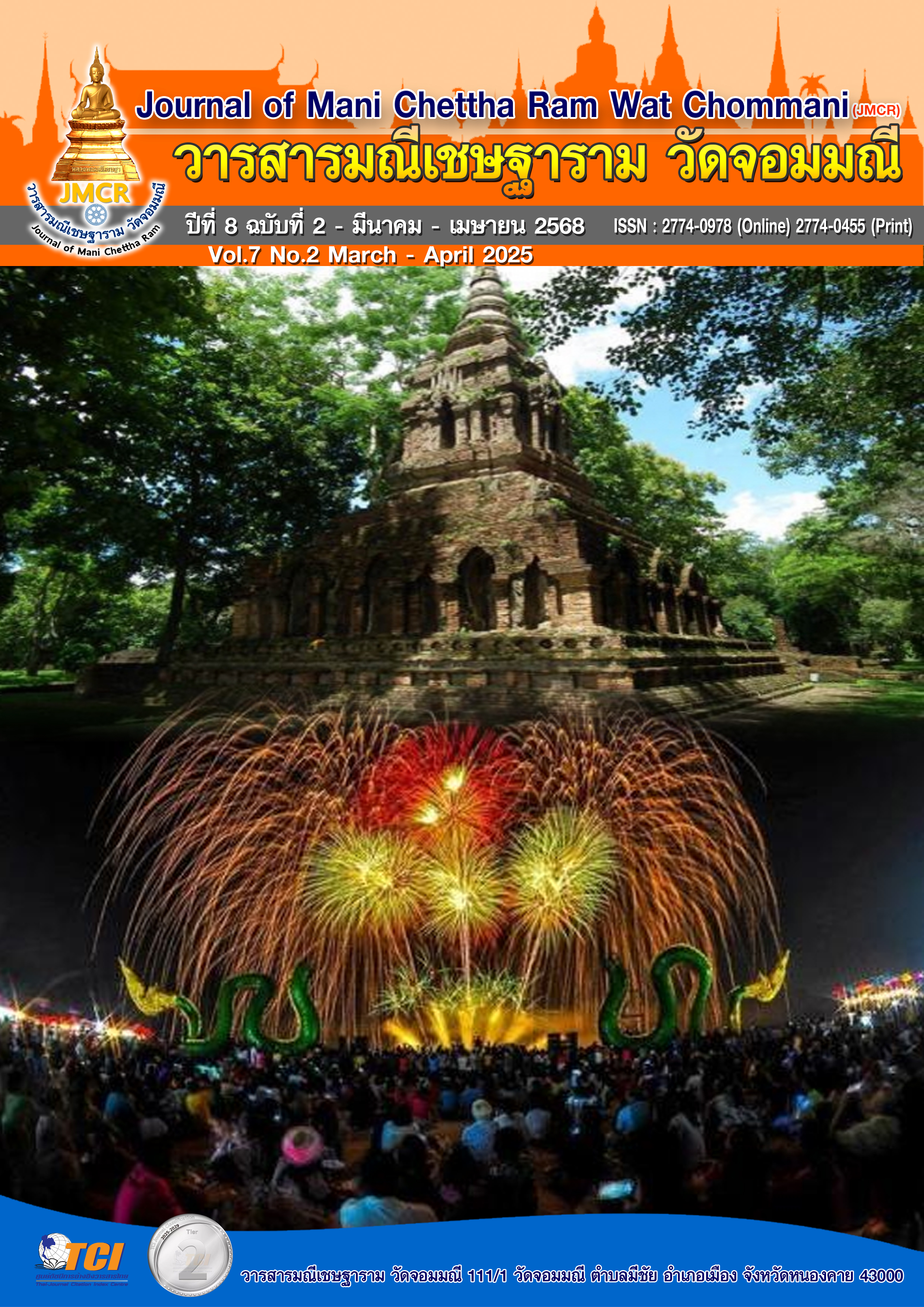STRATEGY FOR DEVELOPING VISIONARY LEADERSHIP OF SCHOOL EXECUTIVES IN ENHANCING AN ACHIEVEMENT CULTURE IN THE MUEANG CHONBURI 3 SCHOOL CLUSTER UNDER CHONBURI PRIMARY EDUCATIONAL SERVICE AREA OFFICE 1
Keywords:
Leadership Development Strategy, Visionary Leadership, Organizational CultureAbstract
The objectives of this research were to: 1) Study the level of visionary leadership 2) Study the strengths, weaknesses, opportunities, threats, and essential needs for developing visionary leadership 3) Propose strategic approaches for developing visionary leadership among school administrators to enhance a results-oriented organizational culture within the Mueang Chonburi 3 School Cluster under Chonburi Primary Educational Service Area Office 1. The sample group consisted of 196 participants, including school administrators and teachers, selected through simple random sampling. A total of 162 respondents completed the questionnaire. The sample size was determined using Krejcie and Morgan’s table. Data collection was conducted using a questionnaire, and statistical analyses included percentage, mean, standard deviation, and the modified priority needs index (PNImodified).
The research result found that: 1) The overall level of visionary leadership among school administrators in fostering a results-oriented organizational culture was high ( = 3.79, S.D. = 0.86). 2) Regarding the essential needs for visionary leadership, the aspects of vision creation, vision dissemination, and vision implementation were identified as strengths with low priority needs, whereas serving as a role model was categorized as a weakness with high PNImodified = 0.18. Concerning the current state of a results-oriented organizational culture in schools, it was rated at a high level ( = 3.73, S.D. = 0.86, PNImodified = 0.23) 3) The strategic framework for leadership development consisted of two main strategies and four sub-strategies: 1) Enhancing leadership capabilities through learning and experiences aligned with organizational goals. 2) Developing an organizational ecosystem that fosters a positive and motivating work environment.
References
กิสษณี ทวีผล. (2562). อิทธิพลของวัฒนธรรมองค์การแบบมุ่งผลสำเร็จที่ส่งผลต่อประสิทธิภาพในการปฏิบัติงานในสถานศึกษาระดับมัธยมศึกษา สังกัดสำนักงานเขตพื้นที่การศึกษามัธยมศึกษาเขต 16. ใน วิทยานิพนธ์มหาบัณฑิต. นนทบุรี. มหาวิทยาลัยสุโขทัยธรรมาธิราช.
ทักษิณ มวลมนตรี. (2564). ความสัมพันธ์ระหว่างภาวะผู้นำเชิงวิสัยทัศน์ของผู้บริหารโรงเรียนและแรงจูงใจในการปฏิบัติงานของครู สังกัดสำนักงานเขตพื้นที่การศึกษาประถมศึกษามุกดาหาร. ใน วิทยานิพนธ์มหาบัณฑิต. สกลนคร. มหาวิทยาลัยราชภัฏสกลนคร.
รักเกียรติ หงษ์ทอง และธนพงษ์ อุดมทรัพย์. (2559). ภาวะผู้นำเชิงวิสัยทัศน์ในบริบทการนำการเปลี่ยนแปลง. วารสารมนุษยสังคมปริทัศน์, 18(2), 73-87.
รัตนา คนไว. (2564). ภาวะผู้นำเชิงวิสัยทัศน์ของผู้บริหารสถานศึกษาที่ส่งผลต่อประสิทธิผลการปฏิบัติงานของครูในโรงเรียน สังกัดสำนักงาน เขตพื้นที่การศึกษามัธยมศึกษามุกดาหาร. ใน วิทยานิพนธ์มหาบัณฑิต. สกลนคร. มหาวิทยาลัยราชภัฏสกลนคร.
ศุภาพิชญ์ อินแตง. (2565). วัฒนธรรมองค์กรที่ส่งผลต่อความสุขในการทำงานของกลุ่มเจนเนอร์เรชั่นวายในเขตกรุงเทพมหานครและปริมณฑล. ใน วิทยานิพนธ์มหาบัณฑิต. นครปฐม. มหาวิทยาลัยมหิดล.
สมัชชา จันทร์แสง. (2558). การพัฒนารูปแบบความสัมพันธ์เชิงสาเหตุของปัจจัยที่มีอิทธิพลต่อภาวะผู้นำเชิงวิสัยทัศน์ ของผู้บริหารสถานศึกษา สังกัดสำนักงานเขตพื้นที่การศึกษามัธยมศึกษา เขต 18. ใน วิทยานิพนธ์มหาบัณฑิต. จันทบุรี. มหาวิทยาลัยราชภัฏรำไพพรรณ.
สุนีรัตน์ เอี่ยมประไพ. (2557). การศึกษาประสิทธิผลของโรงเรียนประถมศึกษาในสังกัดสำนักงานคณะกรรมการการศึกษาขั้นพื้นฐาน โดยใช้รูปแบบระดับชั้นลดหลั่นเชิงเส้น. ใน วิทยานิพนธ์ดุษฎีบัณฑิต. ปทุมธานี. มหาวิทยาลัยราชภัฏวไลยอลงกรณ์ในพระบรมราชูปถัมภ์.
สุภาวัฒน์ แสงคำมี. (2561). การสร้างวิสัยทัศน์ในสถานศึกษา : พฤติกรรมของผู้บริหาร. ใน วิทยานิพนธ์มหาบัณฑิต. กรุงเทพมหานคร: มหาวิทยาลัยราชภัฏสวนสุนันทา.
Bawonpoj, C. (2024). Education is a process of individual and social development. Journal of Social and Educational Development, 12(1), 45-60.
Coulson-Thomas, C. (2020). Leading organizational innovation. Effective Executive, 23(2), 12-30.
Erlygina, E. (2019). Organizational culture as a factor of organizational innovativeness. Bulletin of Science and Practice, 5(11), 276-279.
Krejcie, R. V. & Morgan, D. W. (1970). Determining Sample Size for Research Activities. Educational and Psychological Measurement, 30 (3), 607-610.
Leonard, D. (2008). Visionary leadership: How to motivate and inspire. Leadership Review, 14(2), 45-67.
Thompson, G. (2005). Getting real about visionary leadership. [online]. Available from : http//:www.newhorizons.org/trans/Thompson.htm.accessed 27 September 2024.




